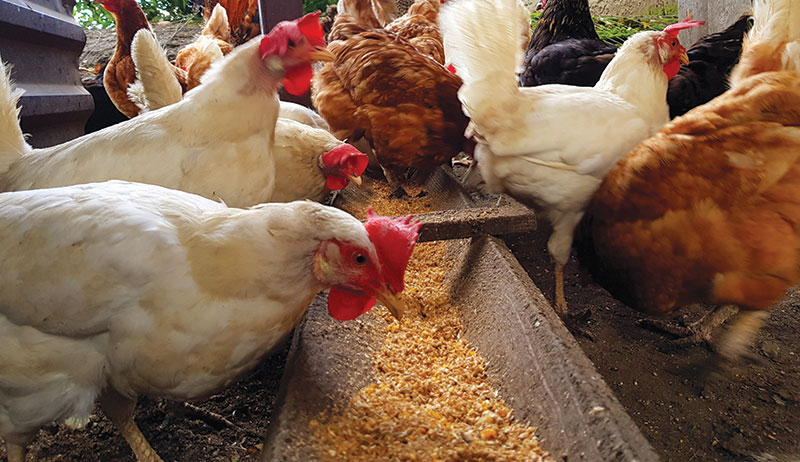Are you a new chicken keeper or considering becoming one? One of the most common questions among enthusiasts is ‘how much do I feed a backyard chicken?’ Proper feeding is essential for maintaining the health and productivity of your feathered friends. In this comprehensive guide, we will cover everything you need to know about feeding backyard chickens.

Introduction to Backyard Chicken Feeding
Backyard chickens are a joy to have, providing fresh eggs and entertainment. However, the key to a happy and productive flock is ensuring they receive the right amount of food. Feeding too much or too little can result in health problems, reduced egg production, and even behavioral issues.

Understanding Chicken Nutritional Requirements
Chickens require a balanced diet to stay healthy. Their diet should include:
- Protein: Essential for muscle development and egg production.
- Carbohydrates: Provide the energy needed for daily activities.
- Vitamins and minerals: Vital for overall health and immune function.
- Water: Clean, fresh water should always be available.
Commercial Chicken Feed
One of the easiest ways to ensure your chickens receive a balanced diet is by using commercial chicken feed. There are different types available, including starter, grower, and layer feed. Each type is formulated for specific stages of a chicken’s life.
Supplementing with Grains and Scraps
While commercial feed is convenient and nutritious, many chicken keepers also supplement their flock’s diet with grains, kitchen scraps, and garden greens. However, it’s important to do this in moderation to avoid nutritional imbalances.
How Much Feed Does a Chicken Need?
So, ‘how much do I feed a backyard chicken?’ Adult chickens typically consume about 1/4 pound (113 grams) of feed per day. This amount can vary depending on factors such as breed, age, and whether they are confined or free-ranging.
Monitoring and Adjusting Feed
It’s important to monitor your chickens’ condition and adjust their feed accordingly. Underweight chickens may need more feed, while overweight chickens may require less. Regularly observing their behavior and body condition can help you make these adjustments.

Special Considerations for Different Chicken Breeds
Different chicken breeds have varying nutritional requirements. For example, regular or mini-sized chickens may need more protein than ornamental breeds. Understanding the specific needs of your breed will help you provide the best care.

The Role of Scratch Grains and Treats
Scratch grains and treats are a fun way to supplement your chickens’ diet, but they should not replace balanced feed. Think of them as snacks enjoyed in moderation. Overfeeding treats can lead to obesity and health issues.
The Importance of Clean Water
Access to clean, fresh water is vital for your chickens’ health. Dehydration can lead to reduced egg production and other health problems. Ensure their water supply is refreshed daily and protected from contamination.
How to Store Chicken Feed
Proper storage of chicken feed is crucial to prevent spoilage and contamination. Here are some tips:
- Store feed in a cool, dry place.
- Use airtight containers to keep pests out.
- Rotate feed regularly to ensure freshness.
Signs of Overfeeding and Underfeeding
Knowing the signs of overfeeding and underfeeding can help you make necessary adjustments:
- Overfeeding: Obesity, reduced egg production, and lethargy.
- Underfeeding: Weight loss, decreased egg production, and feather pecking.
Common Feeding Mistakes
Avoid these common feeding mistakes to keep your flock healthy:
- Over-relying on kitchen scraps.
- Not providing enough protein.
- Feeding moldy or spoiled food.
Using Feeders and Waterers
Using appropriate feeders and waterers can help reduce waste and ensure your chickens have access to food and water at all times. Choose designs that are easy to clean and prevent contamination.
Seasonal Feeding Considerations
Your chickens’ nutritional needs may change with the seasons. In winter, they may require more energy to stay warm, while in summer, they may need more water and electrolytes. Adjust their feed accordingly.
The Impact of Free-Range vs. Confined Chickens
Free-ranging chickens may find additional food sources on their own, such as insects and plants. However, confined chickens rely solely on the feed you provide. Ensure that free-ranging chickens also have access to balanced feed to meet their nutritional needs.
Feeding Chickens at Different Life Stages
Chicks (0-8 weeks)
Chicks require a high-protein diet to support their rapid growth. Starter feed is formulated to meet these needs.
Pullets (8-20 weeks)
As chicks mature, they transition to grower feed, which has slightly less protein but supports healthy development.
Layers (20 weeks and older)
Once pullets start laying eggs, they should be switched to layer feed, which is enriched with calcium to support eggshell production.
External Resources
For more details on colored chicken eggs, check out this article.
Frequently Asked Questions
How often should I feed my backyard chickens?
Chickens should have constant access to feed and clean water. Ensure their feeders are topped up daily.
Can I overfeed my chickens?
Yes, overfeeding can lead to obesity and health issues. Monitor their weight and adjust feed as needed.
What should I avoid feeding my backyard chickens?
Avoid feeding your chickens moldy or spoiled food, as well as foods high in salt or sugar. Certain foods like chocolate, avocado, and raw beans can be toxic to chickens.
As an Amazon Associate, I earn from qualifying purchases.









